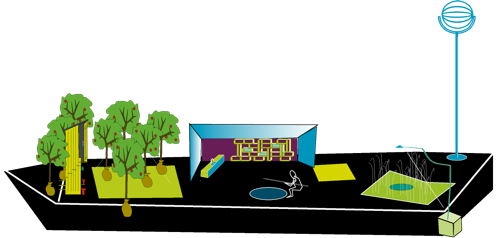

Suburban Ark
Rotterdam Architecture Biennale 2005: the Flood
more

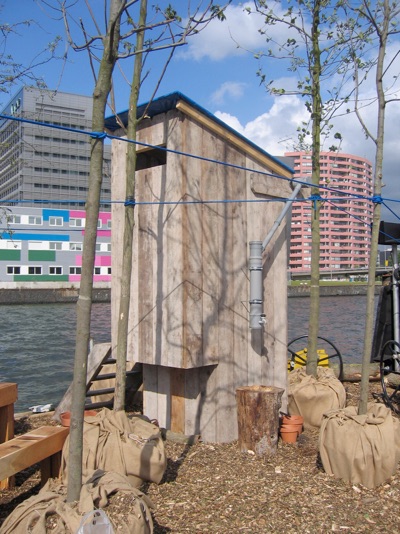
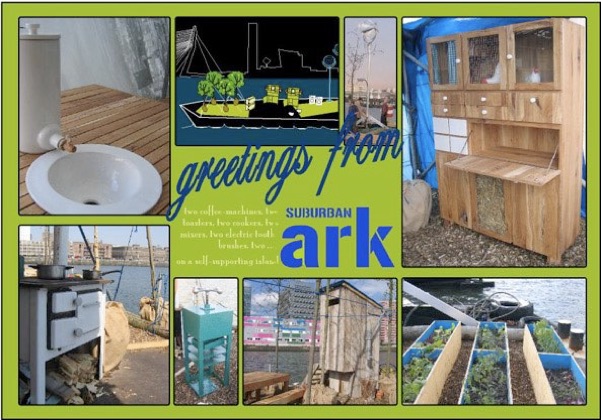
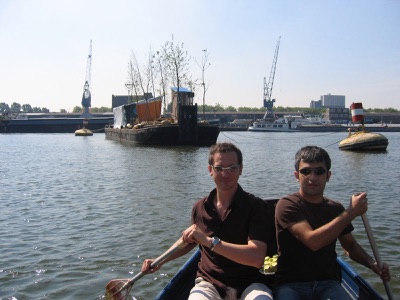
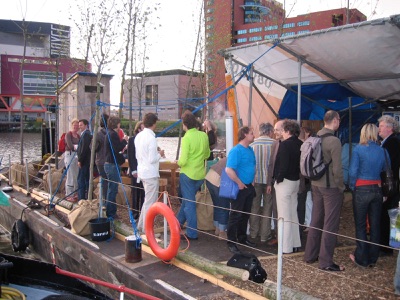
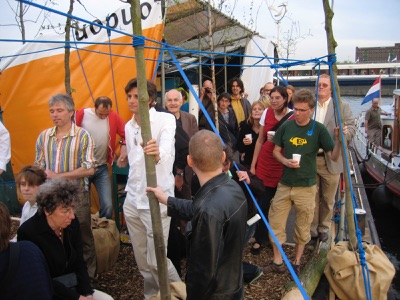
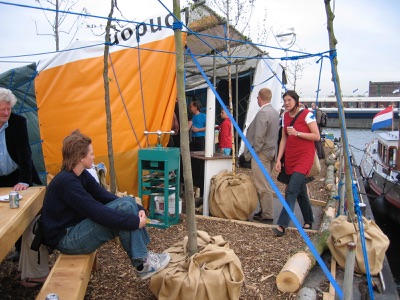
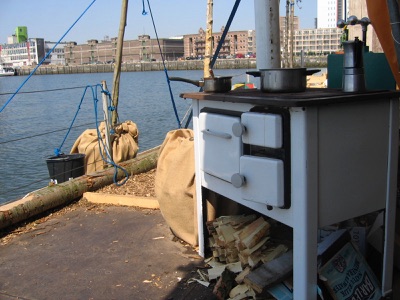
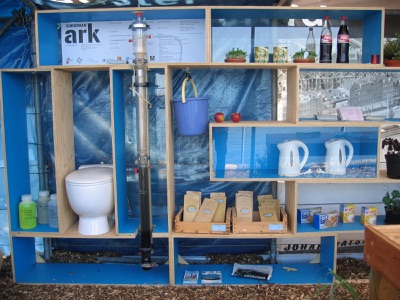
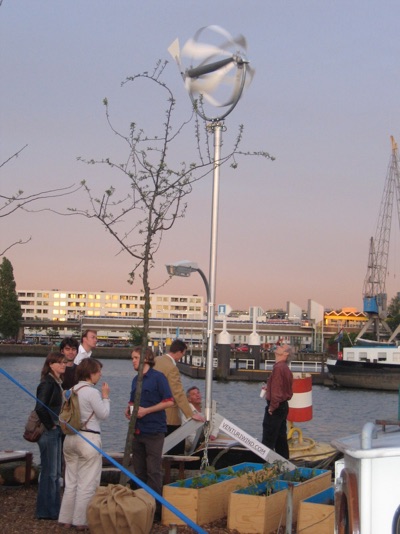
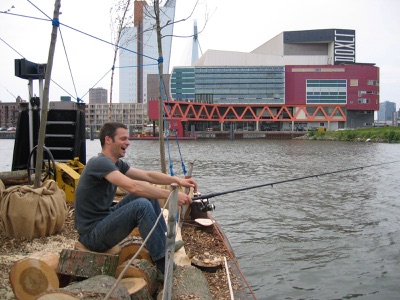
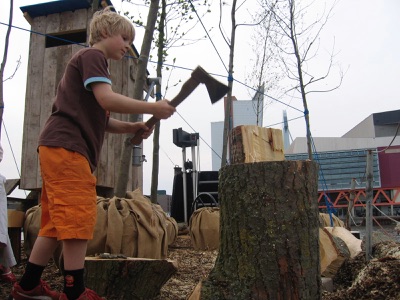
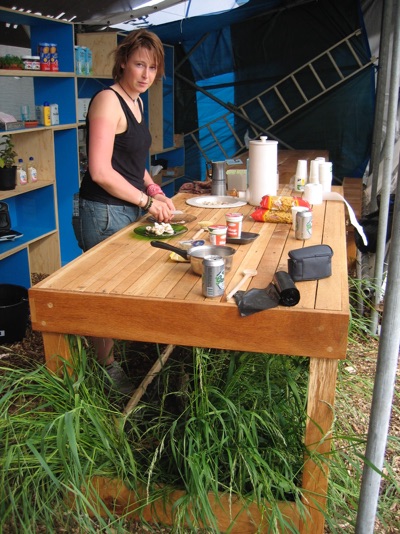
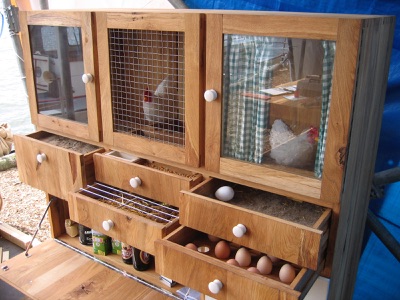
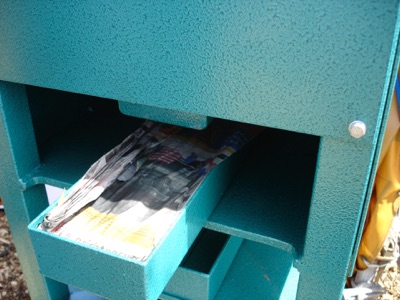
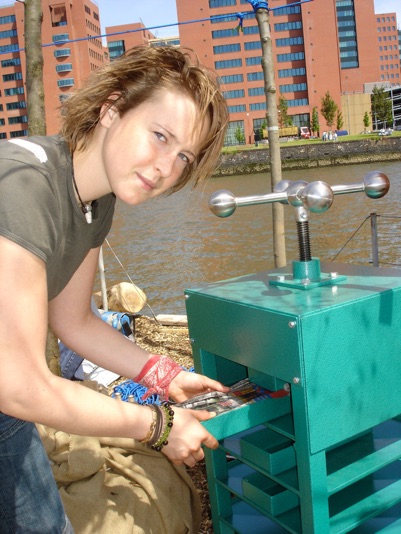
Rotterdam Architecture Biennale 2005

The Suburban Ark is a pontoon with enough space for its own water recycling system and energy production, a chicken coop, a goat, a fish hole and an apple tree. During the Biennale, the Suburban Ark is serving as an operational base for expeditions into Rotterdam’s sewer system, for design workshops about innovative water technologies, and for lecture evenings about unpredictability, complexity and the flood.
It is an installation with an Ark, 2 water cookers, 2 electric toothbrushes, 2 toasters, ... two of everything you can‘t do without. And a composting toilet, a wood-stove, old paper briket-press, 16 apple-trees, a vegetable garden and a windmill. Shown on the International Architecture Biennale Rotterdam 2005.
made possible with a grant from Dutch Art Foundation, sponsored by Philips.
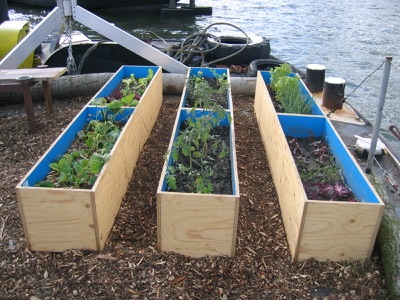
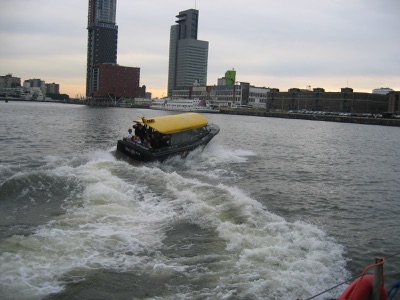
De Suburban Ark verzet zich tegen de op comfort gerichte voorzieningen die woningbouw op het water gelijkstelt aan woningbouw op het land en onderzoekt nieuwe verkavelingstypologieën voor woningen op het water.
De installatie richt zich tegen de dwangmatige verkavelingsgevolgen die door de aanleg van infrastructuur worden opgelegd. Als oplossingsrichting is een reeks meubelen ontwikkeld die zelfvoorzienend zijn en zelf los van bestaande energiebronnen, kabels en leidingen kunnen werken. Een composteringstoilet, een koelkast die werkt op een ijsblok, een aanrecht waar de waterafvoer een champignonkwekerij is, een oventje en een keukenkast met een geïntegreerde kippenstal. De kippen leven er volgens de norm voor scharrelkippen, inclusief scharreluitloop, broedbak met gordijntje en eieropvang. De brandstof voor het oventje wordt geleverd door de oudpapierbrikettenpers. Het ongewenste reclamedrukwerk wordt in de pers tot briketten geperst en daarna in de oven verbrandt. De op de ark aangeplante boomgaard levert naast fruit ook hout om te stoken.
Vinex, 12 november 2004
Dear Tayou,
I suddenly realized why I wrote that letter to
you of all people; it’s because right now we’re
living in African circumstances here. There’s still
no electricity, maybe the power will be back on
tomorrow between eleven and three. Three power
stations were sold to China and shut down, causing
the entire power supply to collapse. They’re trying
to get it going again, divided over the country in
certain periods. Just like when I visited you in
Cameroon, where there’s no continuous power
supply either. I was so surprised back then when
I noticed that you hadn’t set your electric
equipment. Video, stereo, and microwave were
blinking because date and time hadn’t been set.
‘It’s no use’, you said, when I started fi ddling with
the buttons, ‘the power will be off again on
Thursday evening’. Every Thursday evening there
was a standard power failure. When you told me
this, I was so fascinated by the idea...
I tried to fi nd out when we last had a power
failure. It must have been a couple of years ago.
The insurance companies sent us forms to
complete after which they paid us money, by way
of compensation for things such as meat that had
defrosted in our freezers...
The Suburban Ark has given a new meaning to
the culturally defi ned need for security and
modern conveniences that has in our society led
to suburbanization and uniformity. In our day and
age, we have all been reduced to consumers in
the Global Village, and as such we are increasingly
often forced to make choices and decisions in a
process in which more and more certainties are
questioned. The ongoing process of privatization,
deregulation, and liberalization leads to an even
fi ercer degree of consumerism and the further
deterioration of collective facilities.
Who is going to deliver my energy? Which tele-
communications company can best meet my
telephone requirements? Who will deliver my
drinking water? Who will collect my garbage?
These questions date from a period before the
authorities put themselves in charge of these tasks.
In that period, the old-clothes man, the food
scraps collector, and the sewerage cleaner were
seen as private entrepreneurs because they held
jobs enabling them to make a living. Back then,
the structure of society was still transparent and
the debate about values and standards concerned
innocent issues. It is only understandable that the
ultramodern consumer falls back on this period
of cyclic systems thinking and the implementation
of natural processes in everyday behavior.
The project Suburban Ark is not inspired by
nostalgia for those days. It is not about
traditionalism but about the essence of ultra-
modernity in which the romance of the countryside
is intertwined with the level of standard facilities
in contemporary society. Suburban Ark is a project
exploring the facilities of the past, their scale,
and the extreme level of autarky. Sophisticated
time management and the contemporary urban
dweller’s high level of stress tolerance constitute
a surprising combination with the basic needs
of the countryside. Suburban Ark provides a line
of thought that on the one hand gives substance
to the search for meaningfulness and on the
other relativizes the technological dependence
controlling the Global Village.
The reinvention of the countryside is the source
of inspiration for the Suburban Ark. The country-
side is the area where a blown-down tree still
causes a power failure and where muddy dirt
tracks or frozen roads can put a severe strain on
both accessibility and mobility. The stress of
getting your children at the day care center on
time is relativized and replaced by the stress of
recognizing the high level of your dependence;
dependence on energy and water supply companies,
dependence on concerns such as Albert Heijn,
Shell, NS (Dutch Railways) and dependence on
authorities that are pulling out of the welfare
state. In a comfortable and certainties-based
living environment, the elements from the self-
contained countryside cause alienation,
Surviving in VINEX
Ton Matton









